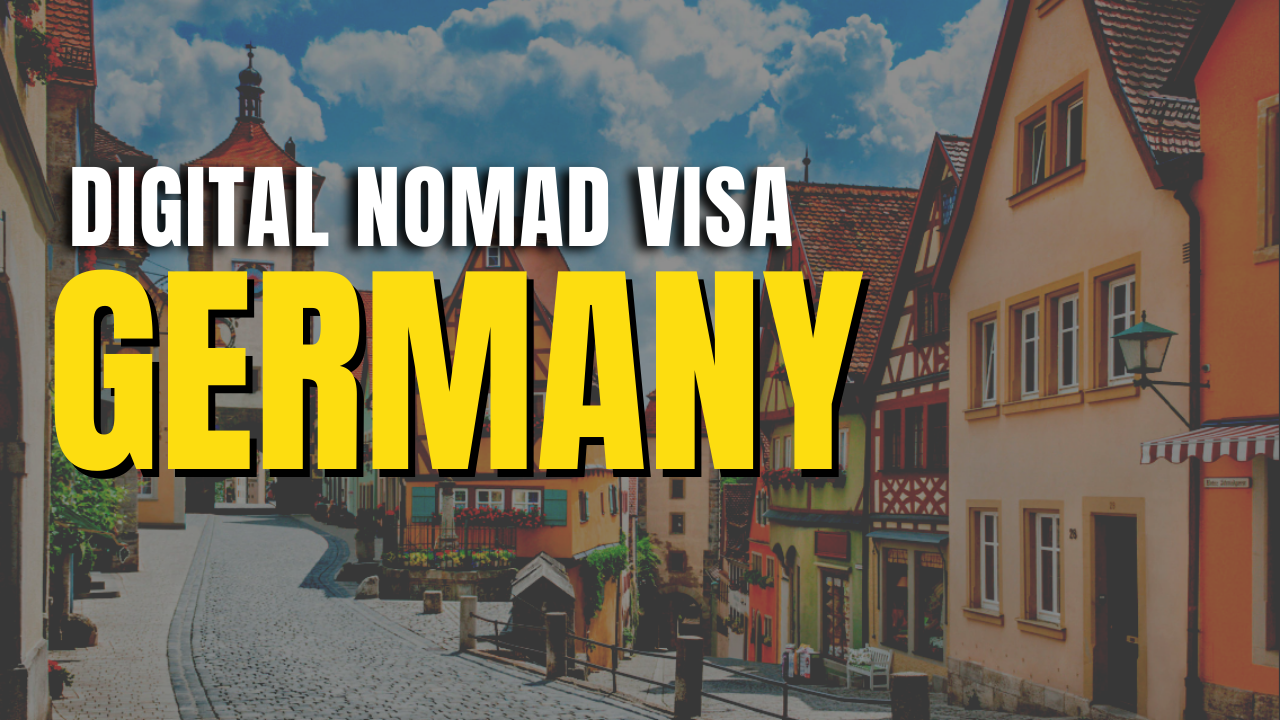Among all the continents around the globe, European countries are the ones who made the valuable decisions for Digital nomads. Germany is one of the favorable countries in Europe where a remote worker can get the fastest internet connection and peaceful surroundings. Moreover, the best thing about Germany is that it’s one of the safest places in the world. So you can roam around the whole country without encountering any crime.
There is a lot to learn from the German lifestyle as they are punctual and well-mannered, which is the foremost reason behind their success. Therefore spending some time in your nomadic life in Germany will bear fruits of positivity in you. Its popular cities like Berlin and Hamburg have many creative coworking spaces with affordable accommodations.
Rather than this, its gardens, beaches, and snow-capped mountains will make you fall for them. Furthermore, you’ll find markets, and incredible cafes all around the city having delicious German food. Most importantly, if you stay in Germany for more than three years, then you can quickly get permanent residence in Germany. Hence getting a German Digital Nomad Visa will be the best choice for your nomadic life.
What is a Digital Nomad Visa?
A digital nomad visa allows remote workers to work remotely in any country. From this visa, a remote worker can legally live in another country for a minimum of six months. But remember that this visa doesn’t allow you to work for locals. Hence, to attain this visa, one has to prove that his contract is with an employer who doesn’t belong to the state where the digital nomad chooses to live.
Is Germany a good country for Digital Nomad Visa?
Traveling and experiencing new places leads you to more success and valuable learning. Therefore being a digital nomad, it’s an excellent opportunity to look for another country where you can work with more fun and ease. Germany is counted among the best places for remote workers in Europe because it is rapidly climbing the heights of technological advancements.
Internet, as it’s readily available across the whole country; therefore, a digital nomad doesn’t have to worry about choosing a city or co-working spaces in Germany. The people there are very homey hence, you can adjust to an entirely new environment in no time.
Rather than remote work Germany has to offer many breathtaking sites, so whenever you feel bored, you can renovate your soul and mind with the beauty of that country. The best part about living in Germany is that if you live there for more than three years, you become eligible to apply for permanent residency in Germany. Thus without hesitating, put Germany on the following bucket list for your nomadic life.
Documents required for Germany Digital Nomad Visa
Look at the must-have documents for applying for a German freelancer visa.
- Before stepping into the German embassy, you must have your passport with the visa application.
- And your photos (they must be according to the terms mentioned on the application form).
- Your proof of revenue with the bank statements and complete details of profit and loss in your freelancing business is required for this visa.
- A resume (having a portfolio of previous work) and at least two recommendation letters from your employer.
- If you’re a university student, you must also submit your degree certifications.
- Furthermore, you should have a solid financial and business plan to show them that you are stable enough to survive in Germany.
- Most importantly, if you are more than 45 years old, so there is a compulsion to submit your retirement plan with your savings proof.
- Remember to bring your travel and health insurance.
Eligibility Criteria
You must meet the following criteria to become eligible for a German freelancer visa as a digital nomad.
- If you have proof that your clients are satisfied with your work (including recommendation letters), you’re eligible for a Germany passive income visa.
- Moreover, you must show that you have accommodation to live in Germany as a remote worker.
- You must be generating revenue of at least $9,711.14 annually.
- If your age is above 45 years, your pension plan must include $1,437.16 monthly savings and assets of about $210,044.
- Most importantly, Germany’s freelance visa is only eligible for people who belong to liberal professions, which includes tax consultants, architects, writers, artists, scientists, dentists, etc.
Germany Digital Nomad Visa Cost
Here are the details for the cost of a Germany Freelancer Visa:
- While applying for a visa, you have to pay an $86.42 visa fee.
- And for a residence permit, the charges are $108.
- The Settlement permit costs about $158.
Germany Digital Nomad Visa Income Tax
Before choosing any country, it is essential to know its tax details. Hence as a freelancer in Germany, you are bound to pay 14% income tax. Moreover, there is also an added value tax of 7% to 19%, which remote workers must pay while residing in Germany.
How to apply for Germany Digital Nomad Visa?
The step-by-step guide is here to assist you in applying as a remote worker in Germany.
-
Documents Required
The primary documents include your passport, income proofs, health and travel insurance, and application for a freelancer visa. After collecting the necessary documents, look at the eligibility criteria too.
-
German Embassy
After gathering your documents, make sure to visit the German Embassy for an appointment and pay the fee for the freelance entry visa (either online or in the bank. It is up to the embassy).
-
Approval Time
For a freelance entry visa, you have to wait for at least three months for its approval.
-
Residence Permit Visa
Once you get your entry visa, then, after entering Germany, get in touch with the foreign authorities to attain your residence permit and Germany’s official freelancing visa.
Benefits of working as a Digital Nomad in Germany
Here are the mind-blowing perks of living as a digital nomad in Germany.
- First of all, you’ll hardly find any internet issues in Germany. Every place has a fast internet connection in Germany, and what could be more significant than this for a freelancer?
- The living style is rather luxurious in Germany, but it’s more affordable than in many other countries of Europe.
- As Germany is rapidly growing in the area of technology, it is getting massive attention from remote workers worldwide. Thus, spending nomadic life in Germany would be beneficial in making connections with other freelancers from diverse regions.
- Moreover, the traveling system of Germany is worth appreciating, and you can travel peacefully to explore the cities.
- The people in Germany are homey, so adjusting yourself there wouldn’t be tough.
- Germany is considered one of the safest countries in the world. They are strict towards law and order, thus the low ratio of crime. Therefore without any fear, you can explore various parts of Germany.
- German food is one of the best in Europe, making your taste buds crave more. Furthermore, the country is a hub of historical sites and scenic beauty, which will become a remarkable memory of your nomadic life in Germany.
Best Cities for Digital Nomads in Germany
Though it’s hard to decide which city in Germany is best because the whole country is fantastic, based on experience, here are the suggestions of cities you can choose to live in Germany on your passive income visa.
Berlin
So let’s begin with its capital city, Berlin. This city is well known for its hustle and bustle. Whether it’s day or night, you’ll always experience joyful moments in Germany. And being a remote worker, Berlin is the best choice to live in as its monthly cost is $1900. Moreover, some great markets and cafes are worth visiting in your leisure time.
Hamburg
Hamburg is one of the most famous cities in Europe in every aspect. The monthly living cost for a freelancer in Hamburg is $2500 to $3,000. It’s a bit expensive, but it has much to offer its visitors. Hamburg beaches and seas are best for enjoying cruise trips.
Dresden
Dresden is for you if you like moderate and warm places in Germany. It’s not that warm but not as cold as other cities in Germany. Moreover, it has old buildings and architecture that make it look royal. The cost of living for a digital nomad in Dresden is about $1500. Although it has few coworking spaces, it has a super-fast Wi-Fi speed.
Munich
A hub of digital creators is Munich. Hence, being a digital nomad, Munich coworking spaces are best for showing creativity. And if you’re a foodie, this city is heaven for you as there are many restaurants and cafés where you can tantalize your taste buds with famous German food. And the living cost for a remote worker in Munich is $2000 to $3000 per month.
Leipzig
It’s a small city in Germany so you can travel easily in it. It has many coworking spaces with a good internet connection. The surroundings of the city are peaceful. If you don’t like getting into a big crowd, then Leipzig will be a good choice.
Best Coworking Spaces for Remote Workers in Germany
Here is the list of best coworking spaces in Germany, especially for Digital Nomads.
- THE 9TH, Cologne.
- Werk1, Munich.
- Betahaus, Kreuzberg.
- Mindspace, Hamburg.
- BEEHIVE, Frankfurt.
- Rent24 Hansa Haus, Dortmund.
- Wiseman. space, Stuttgart.
People also ask
What is the cost of living in Germany?
A digital nomad’s cost of living ( including accommodation, travel expenses, and food) is $3,912 per month. Its luxurious lifestyle is much more affordable than in other European countries and the USA.
What is the internet speed in Germany?
Before knowing about the visa, a remote worker’s primary concern is internet speed. Hence internet speed in Germany is one of the fastest, with 55 Mbps (average).
How long is the processing time for German Digital Nomad Visa?
After applying for a Germany freelancer visa, you must wait about three months for your approval.
Most Popular European countries with Digital Nomad Visa.
Rather than Germany, here are some other European countries which are best for digital nomads.
- Hungary.
- Portugal.
- Georgia.
- Romania.
- Italy
Can your family join you on Germany Digital Nomad Visa?
Germany allows Digital Nomads to live with their family on this visa. But you must submit separate applications and documents if you’re willing to take your family with you.
Conclusion
After years of hard work as a remote worker, you must reward yourself in the future by becoming a Digital Nomad. Because it is more exploring rather than working. Moreover, look carefully into the eligibility criteria for applying for a specific country. Additionally, complete the application process with all the required documents correctly attached.
Hence Digital Nomad Visa gives you a chance for experiencing a new life and the best thing is that you can even get permanent residence in some countries through a digital nomad visa if you spend at least three to four years in the same country.


